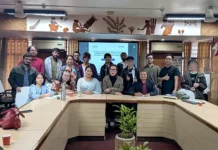IMPHAL, 6 Jan: The Manipur government said that the ambitious goal of providing tap water connections to 4.5 lakh households by this year under the Jal Jeevan Mission (JJM) has hit a roadblock due to the more-than-eight-month-long violent conflict in the state.
Launched in 2019 with a budget of Rs 3,137.42 crore, predominantly funded by the central government, the JJM implementation is stuck at 77 per cent, struggling to overcome hurdles posed by the ongoing ethnic clashes, according to a statement issued by the state’s information & public relations directorate on Friday.
The JJM is a flagship programme of the Centre, which aims at providing all rural households with tap water supply in adequate quantity and of prescribed quality by 2024.
Manipur’s Public Health Engineering Department Chief Engineer Shangreiphao Vashumwo emphasised on the disruptive impact of violence, stating that “the conflict has severely hampered the momentum of the project, obstructing material transportation from outside the state.”
“Logistical difficulties in conflict zones hindered the establishment of village water and sanitation committees, which are crucial for comprehensive rural coverage thereby delaying on-ground implementation,” Vashumwo said.
Despite serving Imphal and its environs, requiring 124 million litres per day of water, through 17 water treatment plants, disruptions in conflict-affected zones such as Kangchup, Kangchup extension, and Potshangbam-II, coupled with sabotage at the Singda treatment plant’s pipeline, severely curtailed water supply.
Vashumwo, however, expressed confidence over reinitiating the works in these areas by engaging local youths from neutral communities on contractual terms.
Additionally, plans to complete pipeline replacements and smart meter installations by mid-year to enhance water distribution efficiency have been made, the official said.
Meanwhile, the scarcity of government-supplied water has forced households to rely on private vendors, purchasing approximately 5,000 litres monthly at the rate of Rs 350 per 1,000 litres.
There are concerns over the safety of procured water with no established government measures to monitor its quality, the official said.
“Collaborative efforts involving government bodies, community engagement and strategic interventions are pivotal to surmounting these obstacles and ensuring the timely completion of the critical project,” he said.
Drying up of springs and wetlands too has significantly contributed to the state’s water scarcity issue.
Environment & Climate Change Department Director (i/c) Tourangbam Brajakumar said that the necessity of a governmental policy, focusing on spring revival and effective water allocation management, is much needed to avert an acute potable water shortage.
“Manipur receives 1,600 mm annual rainfall, which is much higher than other states like Rajathan,” Tourangbam said, adding that the “shortened monsoon period lasting two to three months, in recent years, has led to disruption of groundwater recharge, which is again exacerbated by deforestation in hill catchment areas, causing spring desiccation and river water volume reduction.”
“Nearly 62 per cent of springs in the state have dried up due to this phenomenon,” Tourangbam said, and emphasised on “the urgency of a policy for spring revival to alleviate the water crisis.”
The number of wetlands, over the years, has reduced from 550 to a mere 119, he said, adding that, “to tackle this issue, the department is actively engaged in rejuvenating existing ones.”
The conflict’s ripple effects on vital water infrastructure and the looming spectre of dried springs and vanishing wetlands paint a stark picture of an impending water crisis, the official said.
Immediate policy interventions and concerted efforts are imperative to avert the looming catastrophe, he added. (PTI)

